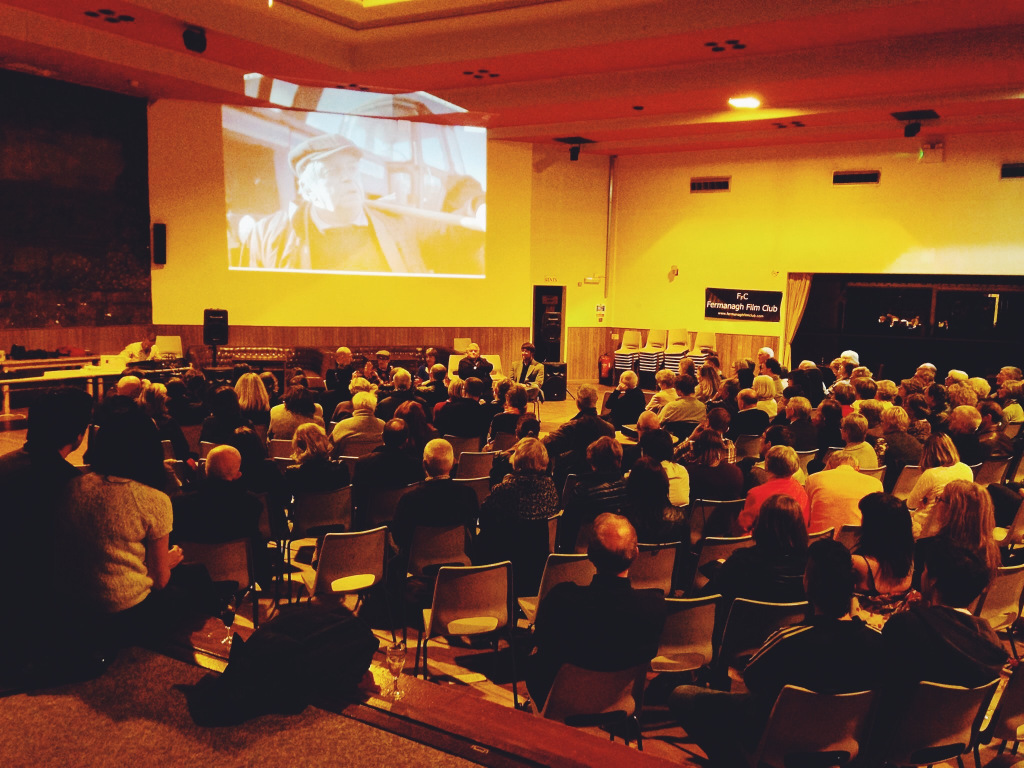Cinemas in Northern Ireland reopened in May after a year of COVID-19 restrictions that kept most of them closed. During lockdown, Jenny McCullough talked to people with a passion for showing films across NI about the tradition of going to the pictures and the future of cinema. In the second of a four-part series, she meets Fermanagh Film Club and Richmount Community Cinema in County Armagh.
Connecting rural communities in Fermanagh
Ann McDermott built Fermanagh Film Club from a quest for access to a cinema programme beyond mainstream blockbusters or “one-star wonders”. Northern Ireland may be over-screened but independent cinema is under-represented, with only the mighty QFT’s two screens classified as specialised. Fermanagh, like much of Northern Ireland, is under-served for transport connections. As Ann told me, “The thing is that QFT in Belfast is an hour and a half drive away and there are no buses after eight o’clock.”
Inspired by student trips to see films like Jules et Jim and Claire’s Knee at the old International Cinema in Dublin, and with the “why not?” kind of encouragement of a friend from Sligo, which is home to Ireland’s oldest film society, in 2007 Ann approached access>CINEMA, which supports the provision of a diverse range of cinema for audiences throughout Ireland. Equipped with the answers to practical questions like “how much does it cost to rent a film to show?”, Ann “put a little ad in the paper saying: ‘anybody interested in getting started locally?’” Those who were met in a hotel and, having made the calculation that a film club would need about 30 members to break even on costs, “set out to get that number.”
Based initially at Fermanagh House, the club found “a kind of a reasonable core of people who just came all the time and supported it and got involved,” Ann said. But “we were … just keeping our noses above water,” and at one point, when it came to paying a licence fee, “it broke us completely … we just didn’t have it.” “In the heel of the hunt” costs were covered, and recovered, from small grants, and then, “in the nick of time” the British Film Institute’s (BFI) Film Hub NI, established in 2013 with QFT in the lead as part of the BFI’s Film Audience Network, arrived on the scene. The club applied for a grant for equipment and “got the actual equipment … we were no longer tied to any one venue or a place with screening facilities”.

From the reopening of Queen’s Film Theatre, Belfast
“They trust us to have a decent programme”
The club was able to build “super programmes” to screen with the help of access>CINEMA, which hosts events:
“Where you meet and discuss a range of maybe thirty films … the idea is that everybody there is representing a cinema in their own home place … and it gives you knowledge of films and a bit of information … there are always a few people who have seen the film and can say ‘this is a really feel good film’ or ‘this is a really hard one and you need to warn your audiences’.”
Ann trekked across Ireland – no mean feat with limited travel connections – to meetings and viewing sessions, and working with access>CINEMA and Film Hub NI was able to screen some touring films, including the locally made A Bump Along the Way, for free. A screening of The White Ribbon “transfixed everybody” and there have been times at the club when:
“The closing credits come on and the lights come on and nobody talks and it takes a few minutes for people to get out of it and start talking … and then nobody will leave … there’s a caretaker in Fermanagh House wanting to get home and you’re saying ‘Come on guys we have to go’ and everybody’s just stuck to the seat riveted and talking to each other.”
Programming has been an interesting process for Ann and others who are naturally drawn to films that are “dark and deep”. She said that some selections have led members to ask for “something light-hearted” to balance “all that arthousy stuff” but remarked on the relationship the club has developed with its audience, saying that although it doesn’t apply to every film-goer, “you build up a certain amount of trust with your audience … they trust us to have a decent programme …they’ll come to one just because it’s on and they’ll trust us.” All in all, said Ann, the club was “doing nicely, until this dreaded plague hit us.”

Fermanagh Film Club pre-lockdown
There’s no substitute for the “communal experience of being together”
This is to understate what Fermanagh Film Club was looking forward to in 2020, as it was due to take up an invitation from the local council to set up in the Ardhowen Theatre: “a dream come true”. The plan was to break the programme in March as usual and return in September at the new venue. But from early March there were worries about the coronavirus and the message from the club was “look, with the way things are we’ve got to protect everybody”. Ann said that although the club was beginning to bring in a younger audience, “our demographic would tend to be an older age group”, which intensified concerns amidst the uncertainty of that time, and the club’s programme was cut short.
The club conducted research with its members about a possible return as part of the staged reopening of theatrical venues. Ann also worked with the council through options for a programme of socially distanced screenings at the Ardhowen, and did think about the feasibility of screening in other venues if council facilities stayed closed, but she says that ultimately she “knew with an absolute certainty that they were not going to be opening with winter coming in.”
Ann noted that while other cinemas were open, some local people were “off like a shot” to see Tenet, for example, but the reasons for hesitancy about trips out and public spaces were well understood. While the roll-out of the vaccination programme made it possible to dream of a limited summer programme, Ann was cautious: “I would have hopes that we can get back in September … but I’m not harbouring any hope or expectation of anything before that.” The latest word is that, working with the council and with social distancing in place, the club should be able to show films to some 50 people from August, potentially as part of a “mini film festival” or by starting the autumn programme early.
In the meantime, the club has organised a programme of suggested synchronised film streamings, followed by Zoom calls to chat about the films. With the usual range of technical difficulties and dropped connections to navigate, members “struggled a bit” but persisted. Evidently, though, it is no substitute for the “communal experience of being together with the big screen”:
“You cannot compare sitting watching a film on your television with the kind of communal experience of being together with the big screen … I mean [the club’s] screens aren’t even that huge but even that is just so much better than just watching it on the telly and the phone rings or you put on the kettle … look, it’s magical.”
Care and comfort at Richmount Community Cinema
Like Ann, Joe Garvey has brought cinema to a community that might not have access to it otherwise. But where other cinemas work hard to grow their audiences, for Richmount Community Cinema manageable numbers means maximum accessibility and comfort for local people with a range of particular needs.
The cinema is one element of a thriving Armagh rural community association with a huge portfolio of projects, taking in history and heritage as well as good relations. Richmount is in the parish of Drumcree and nearby Scotch Street has a growing Bulgarian population, so there is plenty of scope for cultural exchange — and services that have been vital in the different phases of the pandemic. Among the meal deliveries, sewing clubs and t’ai chi classes, one of those services has been getting people online but, as Joe told me:
“A lot of people aren’t on the internet, and this is where the cinema thing comes in … people don’t stream. Their idea of a stream is something that runs into a river.”
Joe said that he “just thought: wouldn’t it be nice to have a community cinema?” but he set about making it happen with the same focus as Ann applied in Fermanagh, getting advice, getting funding and getting equipment. Equipment means a Blu-ray player, a screen and a sound system Joe installed himself in the building he had established for the community association on an old Northern Ireland Water site. As proposed by Joe’s daughter, the first film shown by the cinema was Frozen, complete with volunteers in Elsa and Olaf costumes. It was a hit.
The cinema comfortably seats about 50, which Joe told me was “probably quite enough” and which seems to suit the people with disabilities and learning difficulties who love the Saturday matinée screenings that make a good day out. In the run-up to Christmas, the local school sends “about three lots” of children to see a film and get popcorn and “their pre-packed things that are bad for them”. The older generation is another mainstay of the cinema, and that is reflected in its most popular, most requested film: The Quiet Man. Joe pointed out that although it’s often on television and could be seen at home, people prefer to watch it “among friends”, with a proper interval for tea and a scone. With that incentive, Joe said, there is scope to broaden the programme — “it’s surprising what they’ll watch” — as long as it’s done with care.

Richmount Community Cinema poster
“Unbelievable” response to reopening ideas
The screenings take more time, effort and care than the £3 charged to cover the licence fee for the film. But, Joe said, it was well worth the work to raise the £2.5K or so of Lottery funding and other support that was needed to get set up and develop over the first few years. But looking ahead? Despite the pandemic and the challenges that he had in common with “the big cinemas”, Joe saw a future for the screenings when restrictions were lifted. 20 people could be seated in a socially distanced setting, which would make the cinema more expensive to run. No sooner had he said that than he was on his way to solving the problem:
“You would need to charge £4 just to cover the cinema licence. But that’s not to say I can’t get money from somewhere. You can be good at getting money for things, if you keep trying.”
He was also planning for the possibility of a cinema trip for the older people’s group. The response to floating that idea, he said, had been “unbelievable”.
When I talked to Joe, he said, “To be quite honest, the cinema isn’t even on my agenda at the minute.” The community association was fully occupied with keeping people well during the pandemic. But he was full of ideas about the flexible use of the cinema and the potential for more activities, including documentary-making, all focused on film. It’s easy to imagine Joe making it all happen, starting with another chance to sit down – “That’s what chairs are for,” as Sean Thornton says – to another screening of The Quiet Man.
